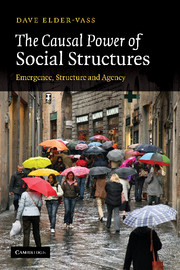4 - Social ontology and social structure
Published online by Cambridge University Press: 06 December 2010
Summary
One of the objectives of this book is to address what I take to be one of the central problems of the social sciences: a radical absence of ontological rigour. Concepts are frequently pressed into service in these disciplines without even the most cursory attempt to establish what their real referents are. In the natural sciences it would be unthinkable to employ a concept like molecule or black hole or chimpanzee, for example, without attempting to understand what range of entities the concept refers to, what they are made of, how their parts must be structured to make such an entity, what properties and powers flow from that structure, how these entities come into existence and how their existence is maintained. But social scientists often seem happy to employ concepts like, for example, discourse, the state, institutions, values, value, money and agents, while ignoring some or all these questions. There is frequently a presumption that we can usefully analyse the social role of such concepts while utterly disregarding their ontological basis. Occasionally, this is even justified explicitly, for example by Winch: ‘To discover the motives of a puzzling action is to increase our understanding of that action; that is what “understanding” means as applied to human behaviour. But this is something we in fact discover without any significant knowledge about people's physiological states; therefore our accounts of their motives can have nothing to do with their physiological states’ (Winch 1958: 78).
- Type
- Chapter
- Information
- The Causal Power of Social StructuresEmergence, Structure and Agency, pp. 64 - 86Publisher: Cambridge University PressPrint publication year: 2010



